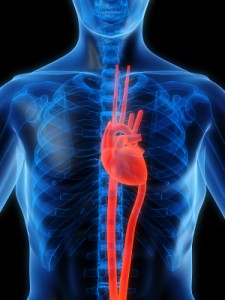Continued from Part 1
The new guidelines are aimed at individuals who would have the greatest risk of a bad outcome if they developed a heart infection.
Antibiotics cover prior to a dental procedure is advised for individuals with:
- artificial heart valves
- a history of infective endocarditis
- certain specific, serious congenital (present from birth) heart conditions, including
- unrepaired or incompletely repaired cyanotic congenital heart disease, including those with palliative shunts and conduits
- a completely repaired congenital heart defect with prosthetic material or device, whether placed by surgery or by catheter intervention, during the first six months after the procedure
- any repaired congenital heart defect with residual defect at the site or adjacent to the site of a prosthetic patch or a prosthetic device
- a cardiac transplant that develops a problem in a heart valve.
The new recommendations apply to many dental procedures, including teeth cleaning and extractions. Patients with congenital heart disease can have complicated circumstances therefore they should check with their cardiologist if there is any question at all as to the category that best fits their needs.
Besides those with heart conditions, who else needs antibiotic prophylaxis?
In addition to those with heart conditions, there are various medical conditions for which clinicians recommended dental prophylaxis, although there is no evidence to support this practice.
The American Academy of Orthopaedic Surgeons (AAOS) recommends that antibiotic prophylaxis be given to those with total joint replacements, compromised immune system, Type 1 diabetes mellitus, recent (within two years) joint replacement, previous prosthetic joint infection, malnourishment and hemophilia. This is meant to reduce the risk of infections at the site of an artificial joint. Patients who have pins, plates or other orthopedic hardware are not affected. Affected individuals should check with their orthopedic surgeon whether they need antibiotic prophylaxis.
Individuals with a variety of immunocompromised conditions should receive antibiotic prophylaxis using the current protocols of the American Heart Association. Such patients would include, but not limited to, those with:
- Human immunodeficiency virus (HIV)
- Severe combined immunodeficiency (SCIDS)
- Neutropenia
- Immunosuppression
- Sickle cell anemia
- Status post splenectomy
- Chronic steroid usage
- Lupus erythematosus
- Diabetes
- Status post organ transplantation
Dental treatment needing antimicrobial prophylaxis in individuals at risk of infective endocarditis
- Teeth extractions
- Periodontal procedures beneath the gumline including probing or cord placement or scaling
- Oral or periodontal or implant surgery or raising gum flaps for any other purpose (including implants)
- Root canal therapy beyond the root apex
- Sialography
- Intraligament local anesthesia
- Rubber dam, matrix or wedge placement beneath the gumline
- Orthodontic bands beneath the gumline
Dental procedures for which antimicrobial prophylaxis is not a requirement in persons at risk from endocarditis
- Dental radiography
- Root canal therapy not beyond apex
- Shedding of primary teeth
- Impression taking of the mouth
- Non-surgical procedures that do not induce bleeding
- Abscess incision and drainage
- Suture removal
- Orthodontic band removal
- Biopsy
Individuals for whom antibiotic cover is NOT considered essential
- Non-cardiac patients
- Immunosuppressed (including transplant patients) or immunodeficient
- In-dwelling intraperitoneal catheters
- Intraocular lenses
- Local tissue augmentation materials
- Pacemakers
- Penile prostheses
- Prosthetic joint implants
- Ventriculo-peritoneal shunts
- Isolated secundum atrial septal defect
- Surgical repair of atrial septal defect, ventricular septal defect, or patent ductus arteriosus
- Previous coronary artery bypass graft surgery
- Mitral valve prolapse without valvar regurgitation
- Physiologic, functional, or innocent heart murmurs
- Previous Kawasaki disease without valvular dysfunction
- Previous rheumatic fever without valvular dysfunction
If antibiotic prophylaxis is necessary, the following medications and dosages are recommended by the AHA:
|
Situation |
Medication |
Dosage |
| Standard prophylaxis | Amoxicillin | Adults: 2.0 g; children: 50 mg/kg orally 1 h before procedure |
| Unable to take oral medication | Ampicillin | Adults: 2.0 g IM or IV; children: 50 mg/kg IM or IV within 30 min before procedure |
| Allergic to Penicillin | Clindamycin or | Adults: 600 mg; children: 20 mg/kg orally 1 h before procedure |
| Cephalexin or cefadroxil or | Adults: 2.0 g; children; 50 mg/kg orally 1 h before procedure | |
| Azithromycin or clarithromycin | Adults: 500 mg; children: 15 mg/kg orally 1 h before procedure | |
| Allergic to penicillin and unable to take oral medications | Clindamycin or Cefazolin | Adults: 600 mg; children: 20 mg/kg IV within 30 min before procedure Adults: 1.0 g; children: 25 mg/kg IM or IV within 30 min before procedure |
A complete listing of recommended procedures can be found at the American Heart Association website.


